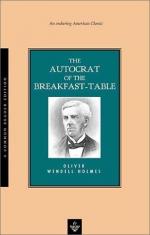|
This section contains 6,871 words (approx. 23 pages at 300 words per page) |

|
Dictionary of Literary Biography on Van Wyck Brooks
In the years between World War I and World War II Van Wyck Brooks was one of the most important intellectual leaders in the United States, lrving Howe dated the beginnings of modern criticism from the publication of Brooks's America's Coming-of-Age in 1915, and the appearance of The Flowering of New England in 1936 brought Brooks most of the accolades awarded for literary scholarship, including the National Book Award and the Pulitzer Prize. The unusual combination of biographical narrative and social commentary that characterized Brooks's work became the model for a new form of literary history that influenced professional critics and delighted the general public. When Dial magazine gave Brooks the Dial Award of 1923, it recognized him as part of a select group of writers that included T. S. Eliol, E. E. Cummings, William Carlos Williams, and Ezra Pound. The tribute that accompanied the award described Brooks as "the most...
|
This section contains 6,871 words (approx. 23 pages at 300 words per page) |

|


